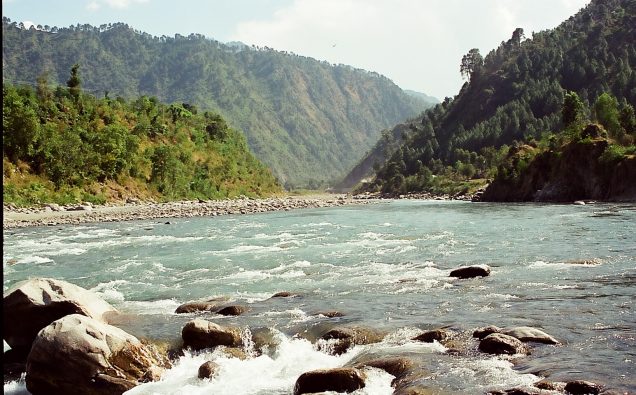
Ravi River Chamba, Image Credit: Vjdchauhan/Wikimedia
India has announced a plan to restrict the flow of water to Pakistan by diverting the eastern rivers Ravi, Sutlej and Beas rivers with an ultimate aim of damaging economy of its arch rival in the region.
“Our government has decided to stop our share of water which used to flow to Pakistan,” Nitin Gadkari, transport and water resources minister, said as New Delhi said it would avenge the killing of 40 security personnel in a militant attack in Pulwama, which it blames on Islamabad.
The Indian minister said in a Twitter message that the country would divert water from eastern rivers and supply it to its people in other northern Indian states.
Gadkari did not elaborate his statements but officials from his ministry said he was restating decisions already taken by prime minister Narendra Modi, including a dam project cleared by his cabinet last December.
Indian announcement has invited sharp criticism from Pakistan and the people who believe that the eastern neighbor is using water as a weapon to terrorize.
“Pakistan may go to International Court of Justice if India does so. The stoppage of water flow will be a blatant violation of Indus water treaty that safeguards Pakistan’s interests as lower riparian,” says former Chief Justice of Pakistan, Justice (retd) Saquib Nisar.
![Wheat fields in Pakistan's Punjab province Credit: Ammarkh Wi]media](https://upload.wikimedia.org/wikipedia/commons/a/a7/WheatFieldsPandjab.jpg)
Wheat fields in Pakistan’s Punjab province Credit: Ammarkh Wi]media
The sharing of water supplies from the Indus river and its tributaries between the two countries is regulated under a 1960 treaty. In recent years India has begun ambitious irrigation plans and construction of many upstream dams, saying its use of upstream water is strictly in line with the treaty.
The water flows into Pakistan from the disputed Jammu and Kashmir territory, a longstanding conflict between the two nations.
However, Pakistan calls these projects violation of Indus Water Treaty that was brokered by World Bank 59 years ago.
In 2016, India had started fast-track development of some of the dam projects especially on the western rivers of Chenab, Indus and Jhelum, escalating tensions between the arch-rivals.
India has been threatening to attack Pakistan and hit its economic and agricultural interests the February 14 attack in Pulwama in the disputed Jammu and Kashmir.
On Thursday, Pakistani prime minister Imran Khan offered hep in investigating the militant attack if India provided proof. Khan also authorized the country’s armed forces to hit back against India if attacked.
Besides stopping the flow of water in the eastern rivers, India has also released water into the western rivers of Chenab and Jhelum, creating fears of flood in Pakistan’s province of Punjab.
“The flow in the river of Chenab had reached 100,000 cusecs on Thursday but it has receded to around 50,000 cusecs today,” said Muhammad Riaz, Director General Pakistan Meteorological Department.
He believes that releases by India would do a favor as the lake of Mangla Dam over River Jhelum needs a lot water before filling to its brims.
If India actually stops water flow into Pakistan, experts say, it will be considered an act of aggression, further spiraling the tensions between the two nuclear-armed nations.
The international community will also see it as a clear violation of the Indus Water treaty.
















